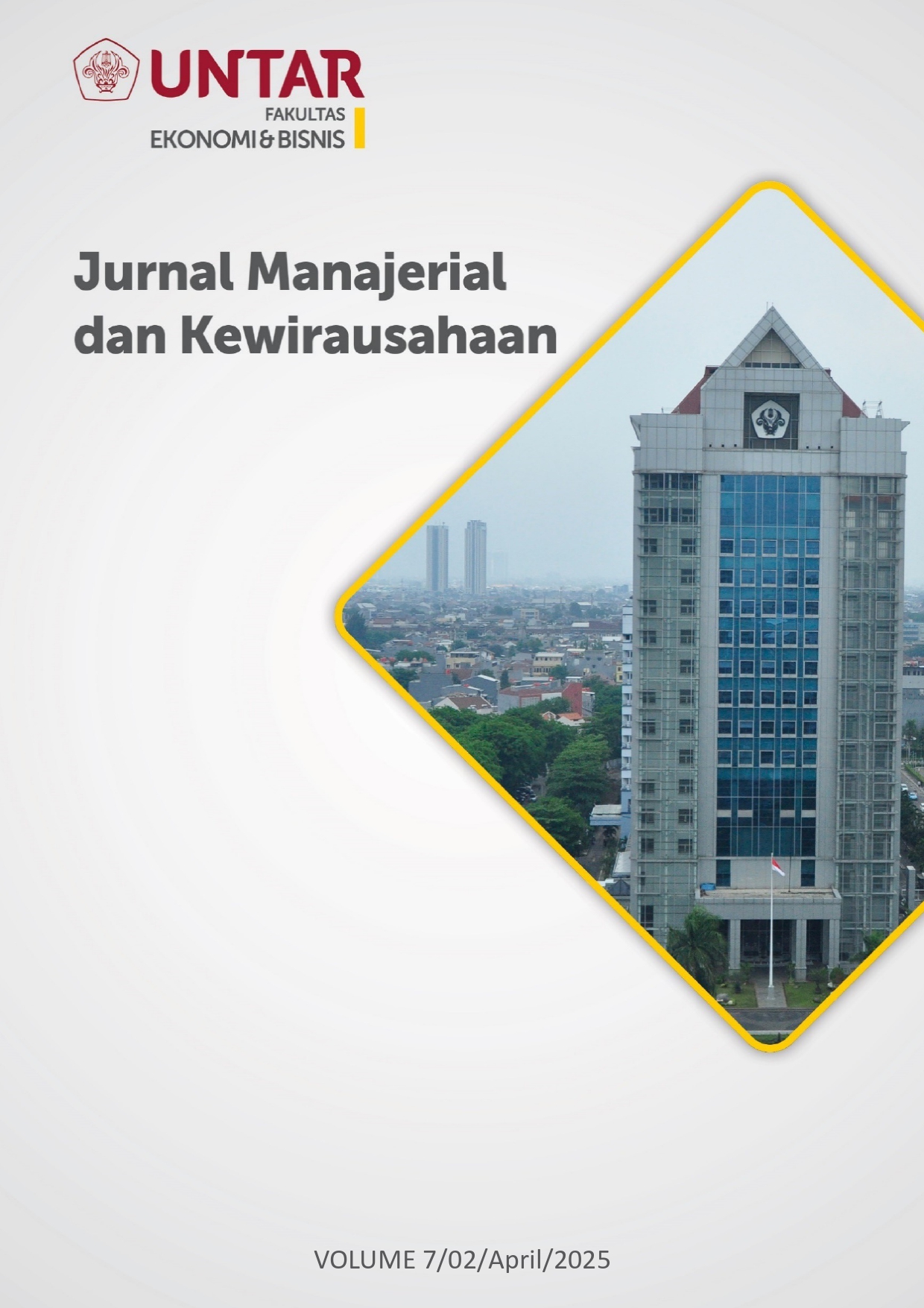Orientasi Kewirausahaan: Mediator Pengetahuan Manajemen pada Adopsi E-Commerce
Main Article Content
Abstract
The purpose of this study is to analyze the influence of innovation, risk-taking and proactive on the adoption of e-commerce with management knowledge as a mediator. Sample determination by non-probability sampling method with purposive sampling. Data collection with a questionnaire that has been distributed by 73 respondents who own Food & Beverage SMEs in Cikarang. Data analyzer using SmartPLS 4.0 software. The results of the analysis showed the influence of innovation, proactive has a significant influence on e-commerce adoption but risk-taking is not significant to e-commerce adoption. Innovation, risk-taking and proactive have a significant influence on e-commerce adoption with management knowledge as mediator, resulting in partial mediators on innovation and proactive on e-commerce adoption with knowledge management as mediators and full mediator on risk ttasking on e-commerce adoption. Knowledge management has a significant influence on e-commerce adoption.
Article Details
Section

This work is licensed under a Creative Commons Attribution-NonCommercial-ShareAlike 4.0 International License.
This work is licensed under a Jurnal Muara Ilmu Ekonomi dan Bisnis Creative Commons Attribution-ShareAlike 4.0 International License.,/p>
References
Abebe, M. (2014). Electronic commerce adoption, entrepreneurial orientation and small-and medium-sized enterprise (SME) performance. Journal of Small Business and Enterprise Development, 21(1), 100-116. https://doi.org/10.1108/JSBED-10-2013-0145
Adam, S., Mahadi, B., Panatik, S. A., & Rahman, A. (2018). The mediating role of knowledge management in e-Business in Malaysia. Asia-Pacific Management Accounting Journal, 13(2), 1-25.
Alavi, M., & Leidner, D. E. (2001). Review: knowledge management and knowledge management systems: conceptual foundations and research issues MIS Quarterly, 25(1), 107-136. https://doi.org/10.2307/3250961
Asir, M., Yuniawati, R. A., Mere, K., Sukardi, K., & Anwar, M. A. (2023). Peran manajemen risiko dalam meningkatkan kinerja perusahaan: studi manajemen sumber daya manusia. Entrepreneurship Bisnis Manajemen Akuntansi, 32-42. https://doi.org/10.37631/ebisma.v4i1.844
Brettel, M., Chomik, C., & Flatten, T. C. (2015). "How Organizational Culture Influences Innovativeness, Proactiveness, and Risk-Taking: Fostering Entrepreneurial Orientation in SMEs". Journal of Business Research, 68(5), 1094-1104. https://doi.org/10.1111/jsbm.12108
Clohessy, T., & Acton, T. (2019), "Investigating the influence of organizational factors on blockchain adoption: An innovation theory perspective", Industrial Management & Data Systems, Vol. 119 No. 7, pp. 1457-1491. https://doi.org/10.1108/IMDS-08-2018-0365
Crant, J. M. (2000). Proactive behavior in organizations. Journal of Management, 44(3), 974-1005. https://doi.org/10.1177/014920630002600304
Dess, G. G., & Lumpkin, G. T. (2005). The role of entrepreneurial orientation in stimulating effective corporate entrepreneurship. Academy of Management Executive, 19(1), 147-156. https://doi.org/10.5465/ame.2005.15841975
Donate, M. J., & de Pablo, J. D. S. (2015). The role of knowledge-oriented leadership in knowledge management practices and innovation. Journal of Business Research, 68(2), 360-370. https://doi.org/10.1016/j.jbusres.2014.06.022
Ephelia, G. R., & Puspitowati, I. (2022). Pengaruh fokus pelanggan, respon pelanggan, proaktif, inovasi dan pengambilan resiko terhadap kinerja UKM. Jurnal Manajerial dan Kewirausahaan, 4(3), 712-720. https://doi.org/10.24912/jmk.v4i3.19765
Gupta, V. K., Niranjan, S., Goktan, B. A. et al. Individual entrepreneurial orientation role in shaping reactions to new technologies. Int Entrep Manag J 12, 935–961 (2016). https://doi.org/10.1007/s11365-015-0373-4
Laudon, K. C. & Traver, C. G. (2012). E-commerce 2012 (business, technology, society) Eight editions. Pearson.
Lumpkin, G. T., & Dess, G.G. (1996). Clarifying the Entrepreneurial Orientation Construct and Linking it to Performance. Academy of Management Review, 21(1), 135-172. https://doi.org/10.5465/amr.1996.9602161568
Madhoushi, M., Sadati, A., Delavari, H., Mehdivand, M., & Mihandost, R. (2011), “Entrepreneurial orientation and innovation performance: the mediating role of knowledge management”, Asian Journal of Business Management, Vol. 3 No. 4, pp. 310-316.
Moshonsky, M., Serenko, A., & Bontis, N. (2019). Practical relevance of management research: The role of doctoral program graduates. In Effective knowledge management systems in modern society (pp. 236-265). IGI Global. 10.4018/978-1-5225-5427-1.ch012
Nambisan, S., Wright, M., & Feldman, M. (2019). The digital transformation of innovation and entrepreneurship: Progress, challenges and key themes. Research Policy, 48(8), 103773. https://doi.org/10.1016/j.respol.2019.03.018
Nasution, M.D.T.P., Rafiki, A., Lubis, A., & Rossanty, Y. (2021), "Entrepreneurial orientation, knowledge management, dynamic capabilities towards e-commerce adoption of SMEs in Indonesia", Journal of Science and Technology Policy Management, Vol. 12 No. 2, pp. 256-282. https://doi.org/10.1108/JSTPM-03-2020-0060
Park, J., Lee, D., & Ahn, J. (2004). Risk-Focused E-Commerce Adoption Model: A Cross-Country Study. Journal of Global Information Technology Management, 7(2), 6–30. 10.1080/1097198x.2004.1085637
Praditya, R. A. (2022). Adopsi E-Commerce dari Usaha Kecil dan Menengah Selama Pandemi COVID-19. International Journal of Social, Policy and Law, 3(2), 6-10.
Rusdiana. (2014). Kewirausahaan Teori dan Praktek. Pustaka Pustaka.
Schilling, M. A. (2017). Strategic Management of Technological Innovation. McGraw-Hill Education.
Sitkin, S. B., & Weingart, L. R. (2017). Determinants of risky decision-making behavior: A test of the mediating role of risk perceptions and propensity. Academy of Management Journal, 60(3), 144-163. https://doi.org/10.5465/256844
Vidal, Joaquín & Sengupta, Kishore & Lapiedra, Rafael. (2013). Knowledge management and innovation performance in a high-tech SMEs industry. International Small Business Journal. 31. 454-470. 10.1177/0266242611417472
Whidya. U, Christina, Tambunan, D & Padmalia, M. (2021). Analysis of Innovation, Proactive, and Risk Taking as Presentations of Entrepreneurial Orientation towards Business Success of Second and Third Generation Family Business in Indonesia. Jurnal Entrepreneur dan Entrepreneurship. 10. 10.37715/jee.v10i1.1553
Wilson, H., & Puspitowati, I. (2022). Pengaruh inovasi, pengambilan risiko, proaktif, otonomi dan agresivitas bersaing terhadap kinerja UKM di Jakarta Barat. Jurnal Manajerial dan Kewirausahaan, 4(1), 115-123. https://doi.org/10.24912/jmk.v4i1.17174
Yeh, C., Lee, G., & Pai, J. (2012), "How information system capability affects e‐business information technology strategy implementation: An empirical study in Taiwan", Business Process Management Journal, Vol. 18 No. 2, pp. 197-218. https://doi.org/10.1108/14637151211225171
Zhu, Y., Wittmann, X., & Peng, M. W. (2012). Institution-based barriers to innovation in SMEs in China. Asia Pacific Journal of Management, 29, 1131-1142. https://doi.org/10.1007/s10490-011-9263-7

